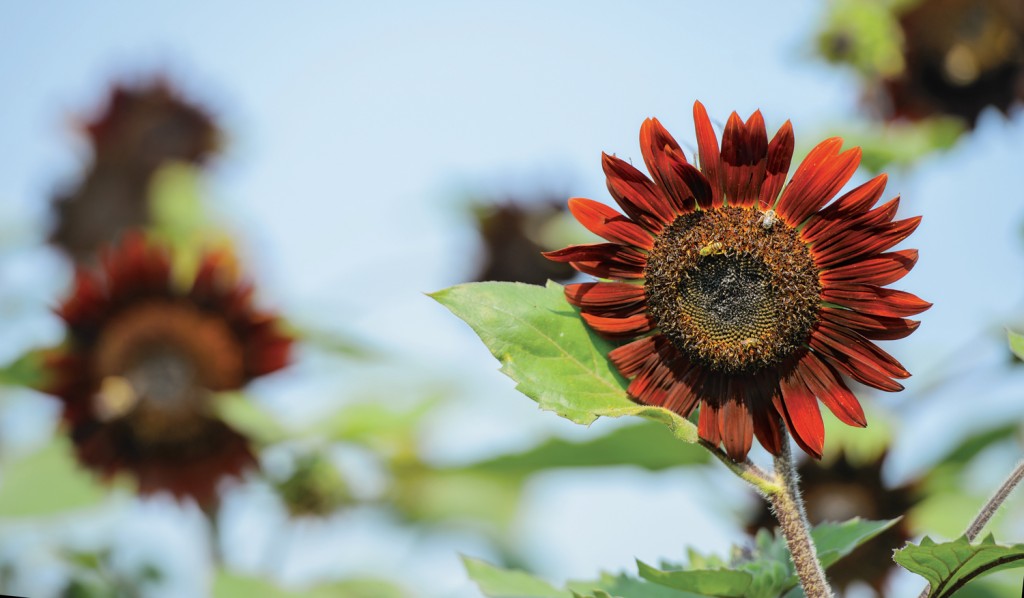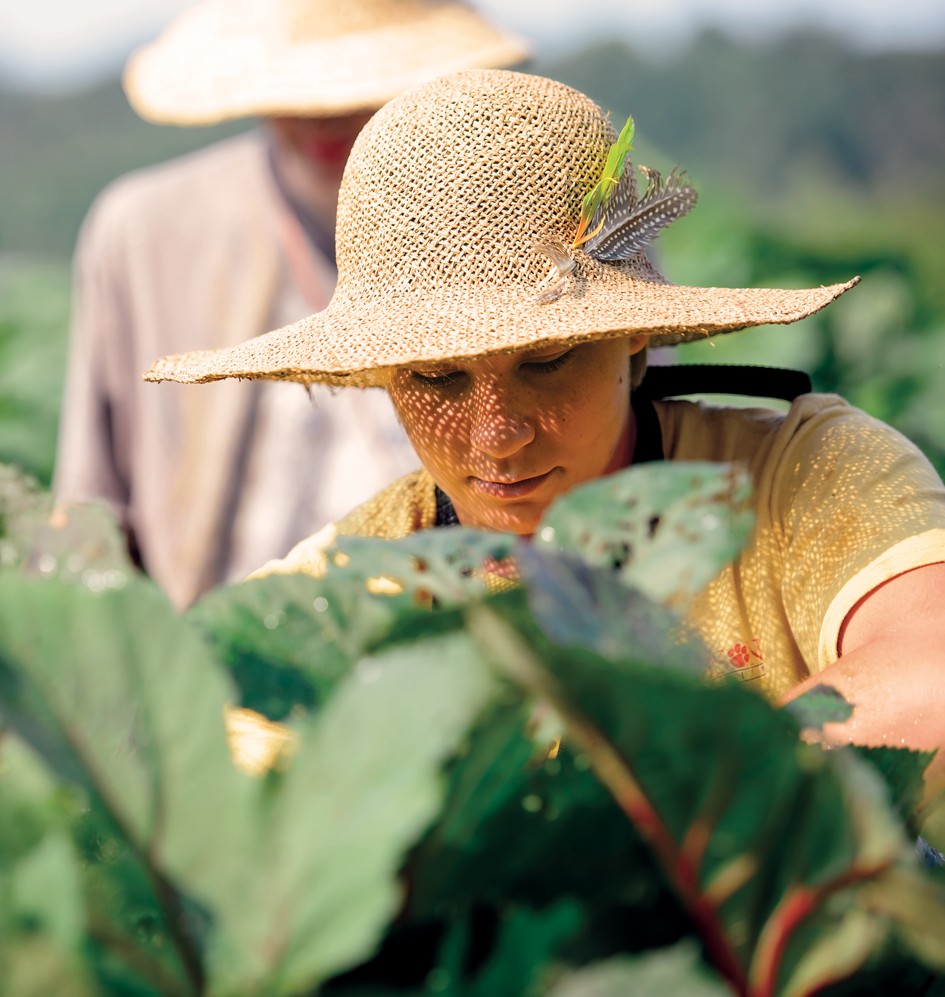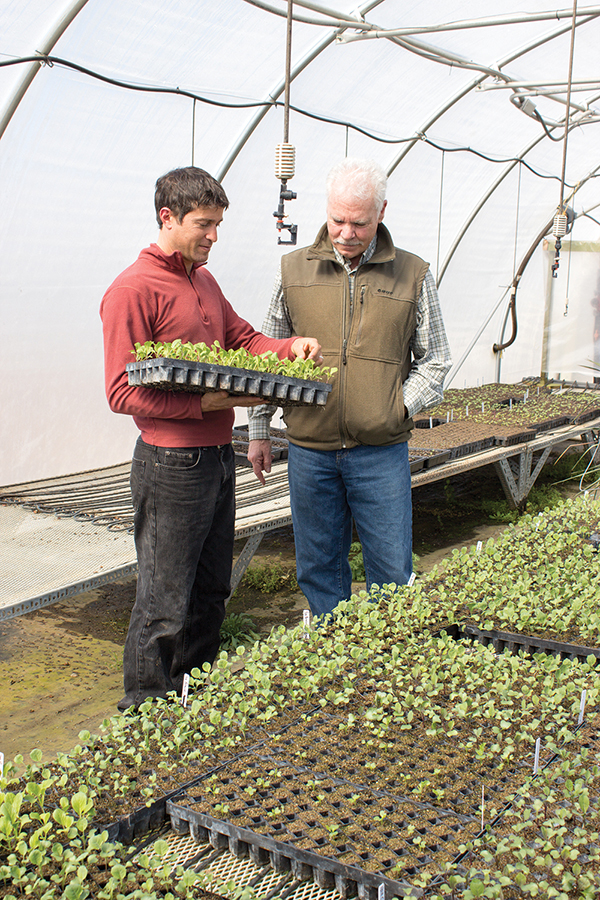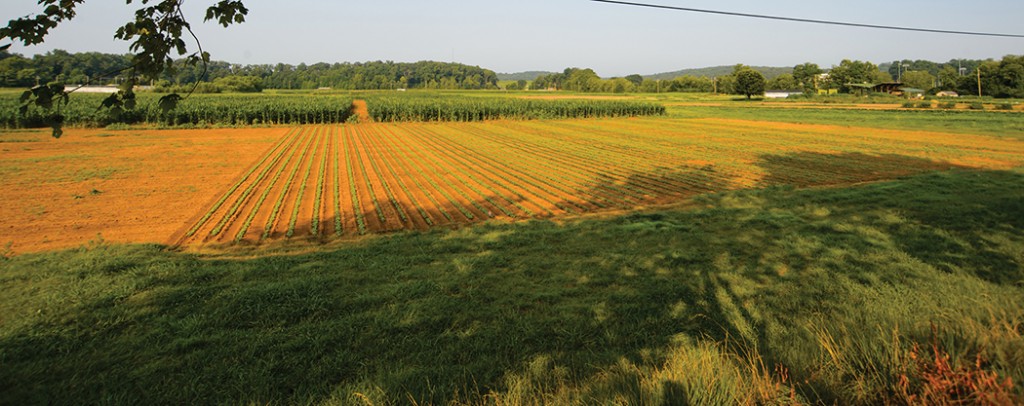locally grown
by Neil Caudle
 Part farm and part research station, the Student Organic Farm is a living laboratory for those who want to learn the rhythms of the land. Photo by Ashley Jones.
Part farm and part research station, the Student Organic Farm is a living laboratory for those who want to learn the rhythms of the land. Photo by Ashley Jones.
Growing room for local farms: A student farm cultivates research along with the veggies.
In restaurants and food markets across the country, the labels are popping up more often, these days: “organic” or “locally grown.” For consumers, the notion seems earthy and simple: Support your local farmers, help them protect the environment, and keep some risky chemicals out of your family’s food.
But organic farming for a local market is far from simple. In fact, the know-how required to grow and deliver high-quality food without the aid of modern chemistry and the economies of large-scale agriculture is formidable—as much an art as a science, so far.
“Right now I see a lot of interest in locally grown food, and we don’t have enough to meet the demand,” says Geoffrey Zehnder, an entomologist and faculty administrator for Clemson’s Student Organic Farm.
Zehnder knows, for example, how quickly an insect pest can strip a field and leave the farmer with nothing to sell. In organic farming, you can’t just reach for a bigger hammer, when things go awry. You have to outsmart the weather, the market, and the pests. That’s some tricky territory, and Zehnder is trying to help aspiring farmers learn the lay of the land.
“I think we’re seeing farmers getting the credit they deserve for how much they have to know about soils, pests, plant physiology, engineering, and all the rest,” he says. “Some of the farmers we know, we call them ‘star farmers’ because they’re almost celebrities. People seek them out for their knowledge. Shawn is one of them. He reads and reads and reads.”
 Carly Cox, an undergraduate student in biosystems engineering, picks okra at the Student Organic Farm. Photo by Ashley Jones.
Carly Cox, an undergraduate student in biosystems engineering, picks okra at the Student Organic Farm. Photo by Ashley Jones.Rising demand from customers
Shawn Jadrnicek, who has managed the farm since 2011, oversees six or eight students who tend approximately five acres, learning to raise not only a wide range of vegetable crops but also freshwater prawns (often called freshwater shrimp), an innovation that will make use of several outdoor ponds.
Certified organic for each of the last ten years, the farm’s main market is a community-supported agriculture program (CSA) in which customers subscribe for regular provisions over two fourteen-week seasons. Demand for the produce has been growing. “We’ve upped the subscriptions to a hundred and twenty-five members,” Jadrnicek says.
The farm started in 2001 as “a little market garden,” Zehnder says. “When Shawn got here, he transformed the farm and made it run a lot more efficiently.”
In the green profusion of summer, it’s easy to glance at the farm as you pass on Perimeter Road and miss the signs of science in progress. But Zehnder and Jadrnicek say that the research they’re conducting is helping South Carolina farmers compete for a share of a market with plenty of growing room.

Farming year-round
On the coldest day of the year, farm manager Shawn Jadrnicek (left), and Geoffrey Zehnder, a professor and faculty administrator, check seedlings in the greenhouse. Starting crops early helps the farm get a jump on the season—and the weeds. Photo by Neil Caudle.
Warming up a cold greenhouse
The research goes year-round. When I visited the farm back in March, on the coldest day of the year, Jadrnicek was testing a new composting system that will yield not only a soil amendment but heat for the greenhouses. Pipes under the compost pile collect heat generated by hard-working microbes and direct it into the greenhouses, where seedlings get a jump on the season.
An organic no-till system that Jadrnicek and his graduate student, Dave Rob, are testing “has tremendous potential,” Zehnder says. “You can grow the cover crop over the fall and winter, and then in the spring you’ve got this big biomass that you roll down, and that serves as the organic mulch to keep weeds from popping up, not to mention the organic matter and the benefits from that.”
Another new line of research involves growing a crop of mustard as a fertilizer source. David Thornton, a researcher in Clemson’s biofuels program, will use a press to extract the mustard oil to make biodiesel, and the farm will apply the meal as fertilizer. “We’re trying to be as self-sufficient as possible,” Jadrnicek says. “Our goal is to get all of our nutrients from campus or by growing them.”
Zehnder says that students on the farm come from various schools and departments. “We get some ag students, but we also get some from liberal arts, from environmental engineering, and other areas. I think the whole local food movement has raised awareness among young people about food and where it comes from. I’ve been here since two thousand, and every year there’s more and more interest. Kids just have a passion for it.”
The skills students acquire on the farm have been paying off, Zehnder says. Several graduates have become farmers or farm managers elsewhere, some in the Southeast but others as far away as Alaska.
As new farmers try to meet the demand for organic food locally grown, Zehnder sees a need for research, extension, and education designed to help them succeed. Academically, the research questions are especially challenging because organic farming, he says, depends on a systems approach with many variables, each affecting the rest.
“I think typically it’s been easier in agriculture research to kind of compartmentalize and just look at one thing and control everything else,” Zehnder says. “But in sustainable agriculture you want to consider everything. For example, what effect is the soil going to have on aboveground insect feeding or disease? It’s all related.”
 The Student Organic Farm includes five acres with greenhouses and several ponds. Photo by Ashley Jones.
The Student Organic Farm includes five acres with greenhouses and several ponds. Photo by Ashley Jones.
Geoffrey Zehnder is a professor and coordinator of integrated pest management and sustainable agriculture programs in the College of Agriculture, Forestry, and Life Sciences. Shawn Jadrnicek is the manager of the Student Organic Farm. David Thornton is a research associate in Clemson’s biodiesel program in University Facilities.


